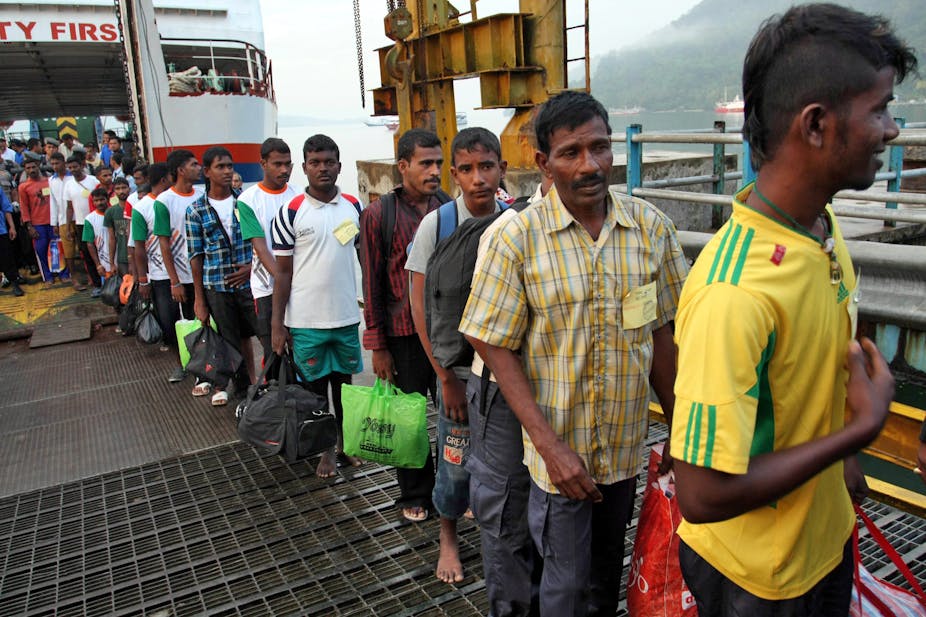It is all pretty confusing. Are Sri Lankan boat arrivals – like the 66 who showed up in the port of Geraldton last month – actually refugees?
Are they fleeing from a country where the police and the army torture and rape citizens, where the media is not permitted to report about what is going on, and where there is no chance of getting redress for any of this, because the judges are biased, and the lawyers are in jail?
Or are these boat arrivals mere “economic” refugees, with secure (if uncomfortable) lives in their own home country?
There is an easily discernible quid pro quo operating here. Australia refrains from seriously criticising the government of Sri Lanka for abuses of power, human rights violations and the failure to fully investigate war crimes committed during the years of conflict. For its part, Sri Lanka’s government does everything in its power to stop Sri Lankans setting sail for Australia.
What threatens to disrupt the quid pro quo and shatter the narrative of Sri Lankan boat arrivals as mere queue-jumping, economically-motivated unauthorised immigrants, is the release of a steady flow of credible, well-researched reports about what is actually going on in Sri Lanka.
The Amnesty International report - Assault on Dissent - published on April 30, is merely the latest of these. The Amnesty report, which details the violent measures taken by the Sri Lankan government to silence its critics, follows a report by the International Crisis Group in February, written after the impeachment of Sri Lanka’s chief justice.
It is quite easy to see why the Australian government doesn’t want these people to be refugees. Sri Lankans constitute the largest proportion of our unauthorised boat arrivals. The Australian government’s ability to send these arrivals straight back to where they came from – or to make their lives miserable while they are here in detention - is helpful (especially in an election year) in propping up a rhetoric of border security, of being tough on illegal immigrants, of catching the queue-jumpers, of stopping the people smugglers.
The Australian government’s idea that there is a deterrent effect to being tough on boat arrivals only really makes sense if those trying to leave are not “real” (in fear of their lives) refugees.
Foreign minister Bob Carr continues to maintain that “it’s wrong to say Tamils live in fear and are fleeing their country”. In this regard, the Sri Lankan government sees eye-to-eye with the Australian government. After the Geraldton debacle, the Sri Lankan High Commissioner to Australia was asked to explain why, if Sri Lanka was so peaceful and safe, Sri Lankan Tamils were leaving Sri Lanka in such large numbers? The High Commissioner’s answer was that they were leaving to pursue economic opportunities; they were coming to Australia for a better life.
Two other credible reports into human rights abuses in Sri Lanka were also released in February. One by Human Rights Watch set out detailed cases of the Sri Lankan authorities use of rape and sexual violence as a means of torture; while the report of the United Nations High Commissioner for Human Rights to the Human Rights Council noted the “continuing reports of extrajudicial killings, abductions and enforced disappearance in the past year”.
An editorial published in The Australian after the arrival of the Sri Lankans in Geraldton asked: “what about real refugees?” In the wake of the recent string of reports, it is becoming harder to jump to the conclusion that those journeying from Sri Lanka are motivated by economic gain – or, in the words of The Australian editorial, merely “discontented”, rather than “desperate”.
You can see at once the tricky position that the Australian government is in in relation to the Commonwealth Heads of Government Meeting (CHOGM) meeting, scheduled to be held in Sri Lanka in November. Canada has announced that it will boycott the meeting on the basis of reports of the Sri Lankan government’s human rights abuses, and the government’s failure to investigate war crimes.

Canada has urged other Commonwealth governments to do the same, and if the Commonwealth still stands for anything at all, it stands as a political forum where countries uphold principles concerning the liberty of the individual and the equal right of all citizens to freely participate in the society in which they live.
The reports mentioned above all document the different ways in which Sri Lanka’s government is failing to meet its most basic obligations to its citizens. Yet how can the Australian government boycott the meeting? To boycott would mean acknowledging the brutal and oppressive conditions that Sri Lankans – especially Tamils – are fleeing from.
It would be tantamount to admitting that there was at least a prima facie case that people fleeing were refugees. It would mean an end to peremptory deportation. And it might very well mean more boats arriving on Australian shores.

